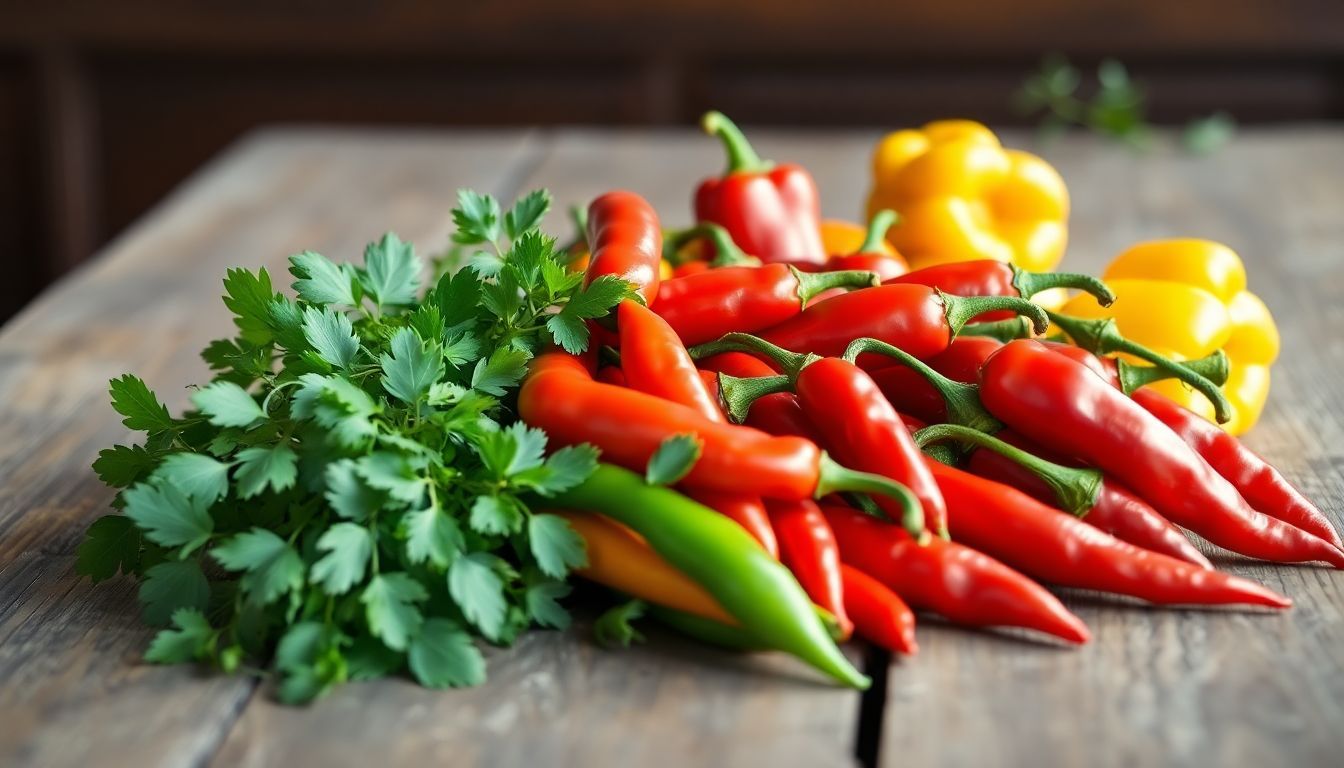Do you wonder if eating spicy foods can help you live longer? Studies show people who eat spicy foods daily may have a 14% lower risk of death. This blog explores how chili peppers and spiciness might improve your health and boost your lifespan.
Thank you for reading this post, don't forget to subscribe!Keep reading to find out more!
Key Takeaways
- Eating spicy foods 6-7 times a week may lower the risk of premature death by 14%, according to a 2015 Harvard study published in BMJ.
- Capsaicin, found in chili peppers, helps reduce bad cholesterol, inflammation, and cancer risks while improving metabolism and heart health.
- Regular consumption of chilies was linked to a 26% lower death rate from heart disease and a 23% reduced cancer mortality rate in Chinese Academy of Medical Sciences studies.
- Overeating spicy foods can cause issues like heartburn, bladder irritation, or digestive discomfort. Moderation is essential for safe benefits.
- Combining fresh spices with balanced meals supports long-term health without risking negative side effects from excess spice intake.
The Link Between Spicy Foods and Longevity
Spicy foods may have a surprising impact on how long we live. Research shows they could improve overall health by reducing risks linked to chronic diseases.
Studies on frequent spicy food consumption
Frequent spicy food consumption has attracted scientific attention for its potential link to longevity. In 2015, a significant study by the Harvard School of Public Health shed light on this topic. Below is a summary of the findings.
| Aspect | Details |
|---|---|
| Study Name | Spicy Food Consumption and Mortality |
| Published In | BMJ (Aug 4, 2015) |
| Participants | Nearly 500,000 adults |
| Age Range | 30 to 70 years |
| Regions | 10 provinces in China |
| Duration | 7 years |
| Deaths Reviewed | 20,224 deaths |
| Key Finding | 14% lower risk of premature death for those eating spicy foods 6-7 times a week |
| Health Benefits Identified | Lower risks of cancer, ischemic heart disease, and respiratory diseases |
| Limitations | Lack of data on other dietary habits, preparation methods, and cultural factors |
The study highlights promising associations, yet it suggests the need for deeper exploration into contributing factors.
Role of capsaicin in promoting health
Capsaicin, found in chili peppers, offers many health benefits. It reduces “bad” cholesterol and triglycerides while lowering inflammation. These effects may protect against heart issues like ischemic heart disease.
Capsaicin also helps metabolism by increasing fat burning, which can aid weight loss.
This compound shows potential in reducing cancer risk due to its anti-inflammatory properties. Fresh chili peppers are especially rich in capsaicin compared to dried ones or processed spicy foods.
Some studies suggest it may even support gut health and fight infections by regulating gut microbiota.
Capsaicin is more than spice—it’s a step toward better health.

Potential Health Benefits of Spicy Foods
Spices can boost your body’s defenses and keep you feeling strong. They may also play a role in improving overall wellness, making them a tasty addition to your meals.
Reduced risk of cardiovascular disease and cancer
Eating spicy foods may lower the risk of heart disease and certain cancers. Studies show that consuming chili peppers often can lead to significant health benefits.
- Regular spicy food eaters had a 26% lower death rate from cardiovascular diseases, such as ischemic heart disease.
- A diet rich in fresh chili peppers or dried chilies helps maintain better cholesterol levels and supports heart health.
- Capsaicin, a compound in chilies, has anti-inflammatory effects that may protect against chronic illnesses.
- Observational studies by the Chinese Academy of Medical Sciences found a 23% reduced cancer mortality rate in those who ate chilies four or more times weekly.
- Capsaicin also reduces oxidative stress, which is linked to cancer and other serious diseases.
Improved metabolism and energy balance
Capsaicin in chili peppers can boost your metabolism. It helps burn fat by increasing energy expenditure, making it easier to balance calorie intake. Studies show that spicy foods may reduce appetite, supporting healthier dietary habits and weight control.
Chili peppers also combat insulin resistance, which helps regulate blood sugar levels. Capsaicin reduces “bad” cholesterol and triglycerides—important for heart health. Its anti-inflammatory properties even fight infections and lower inflammation linked to weight gain or metabolic disorders.
Spicy foods like fresh chili peppers may be small but pack a punch for better metabolic health.
Considerations and Precautions
Eating too many spicy foods can upset your stomach or cause discomfort. Balance is key, as overdoing it might harm more than help.
Possible side effects of excessive spice consumption
Too much spicy food can lead to unwanted health problems. While spices offer benefits, overdoing it has risks.
- Spicy foods may increase gastric acid, causing heartburn or indigestion. This discomfort can worsen with frequent consumption.
- They might irritate the bladder, potentially triggering incontinence or making an overactive bladder worse.
- Eating a lot of chili peppers could aggravate colds or sinus infections. The heat from capsaicin might feel intense during illness.
- Some studies suggest a link between excessive chili pepper intake and gallbladder cancer. These are limited observational studies but worth noting.
- High doses of capsaicin may activate TRPV1 receptors too strongly in the body. This could lead to effects like leg cramps, bowel changes, or even skin rashes.
- Overeating spicy foods may affect people differently based on their digestive health or tolerance levels.
Spices are flavorful and healthy in moderation, but excess intake comes with risks that should not be ignored.
Moderation and dietary balance
Eating spicy foods like fresh or dried chili peppers can offer health benefits, but moderation is key. Overeating spicy meals might cause digestive issues, like heartburn or stomach pain.
A balanced diet that includes fruits, vegetables, whole grains, and lean proteins works best for long-term health—spicy foods should complement this.
Experts recommend pairing chili peppers with healthy dishes such as lentil pilaf or turkey chili instead of greasy meals. Avoid excessive spice consumption to prevent nutritional imbalances.
Following guidelines from studies, like those conducted by the Chinese Academy of Medical Sciences and Harvard School of Public Health, helps promote a healthier lifestyle while enjoying your favorite spices responsibly.
Conclusion
Spicy foods might just spice up your life in more ways than one. Studies hint at a link between chili peppers and better health, like lower risks of heart disease. Capsaicin, found in spicy foods, may help fight inflammation too.
Adding some spice to your meals could boost not just flavor but also wellness—just don’t overdo it! Balance is key for long-term benefits.
